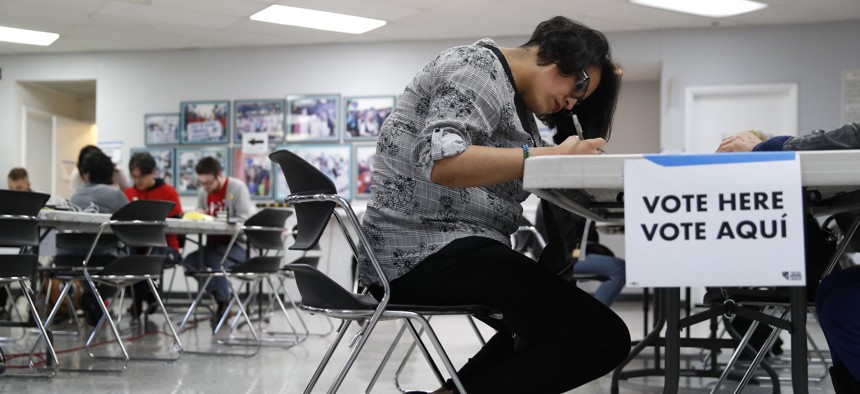West Virginia Scraps Voatz Mobile Voting App

In this Feb. 15, 2020, file photo, a woman votes at an early voting location at the culinary workers union hall in Las Vegas. AP Photo/John Locher
The West Virginia Secretary of State’s Office announced it would use a different electronic absentee voting technology after researchers raised security concerns with the previous voting app it had used.
West Virginia will not use a mobile voting app in its May primary election after researchers discovered exploitable security flaws in the technology.
Instead, the West Virginia Secretary of State plans to deploy a different electronic absentee ballot technology that will allow voters to either cast ballots electronically or to print and mail in ballots.
This switch comes after researchers from the Massachusetts Institute of Technology discovered vulnerabilities in the Voatz mobile voting app, which West Virginia used in a small pilot test during the 2018 general election. The researchers said the security flaws could allow hackers to determine how someone voted or even change their vote. Voatz has criticized MIT’s findings as containing "fundamental flaws."
On Monday, the company expressed gratitude for West Virginia's work during the pilot. "Due to the recent heightened media attention surrounding mobile voting and Voatz, we respectfully acknowledge the needs of the state to work with a different platform for this primary election," Voatz said in the statement.
The West Virginia secretary of state’s office felt secure using the Voatz system thanks to an audit of results the company produced, said Chuck Flannery, deputy secretary and chief of staff. But the MIT research, coupled with the public’s concern over the security of their ballots, played a role in the decision to work with another vendor, he said.
“The public concerns, as well as our concerns about security were things that were certainly of consideration,” Flannery said. “Is now the right time to use Voatz or to give them the opportunity to look at those questions and get the public the information they are looking for?”
Voatz developed the technology to make voting more accessible. West Virginia served as the first pilot project to use Voatz to allow military and overseas voters to cast absentee ballots via an app on their mobile phone or tablet. The company said 144 West Virginians living in 31 different countries used the app to vote in the 2018 elections.
Voatz said it views its test run in the state "as markers of success for the continuation and furthering of mobile voting."
West Virginia lawmakers approved legislation this year that would allow the state to expand the option of electronic absentee voting options to disabled residents who are unable to make it to the polls. Voters with physical disabilities that prevent them from voting in person at the polls can apply for absentee ballots in order to be eligible to use the technology, according to the secretary of state’s office.
Secretary of State Mac Warner announced on Friday that the state would use technology from the Seattle-based company Democracy Live to provide the option for overseas, military and disabled voters in the May 2020 primaries. The company’s voting portal, OmniBallot, allows users to receive and submit an electronic ballot via a secure online portal is hosted on Amazon’s cloud.
The system will be managed by each of the state’s 55 county clerks, and every vote that is cast through the system will produce a paper ballot that can be audited.
“While we expect the number of West Virginia citizens who are eligible to use the electronic ballot option in the May primary election is quite small, the benefits to our democracy are huge,” Warner said.
The state does not have an estimate of how many voters will use the technology. The deadline for requesting absentee ballots is six days before the election, Flannery said.
In addition to West Virginia, several local governments, including ones in Washington state, Colorado, Utah and Oregon, have conducted their own pilots with the Voatz system.
Democracy Live said its secure voting portal has been used in more than 1,000 elections in hundreds of jurisdictions since 2010.
This story was updated after publication to include a comment from Voatz.
Andrea Noble is a staff correspondent with Route Fifty.
NEXT STORY: For Small County Governments, Tackling Cybersecurity Basics Can Go a Long Way





